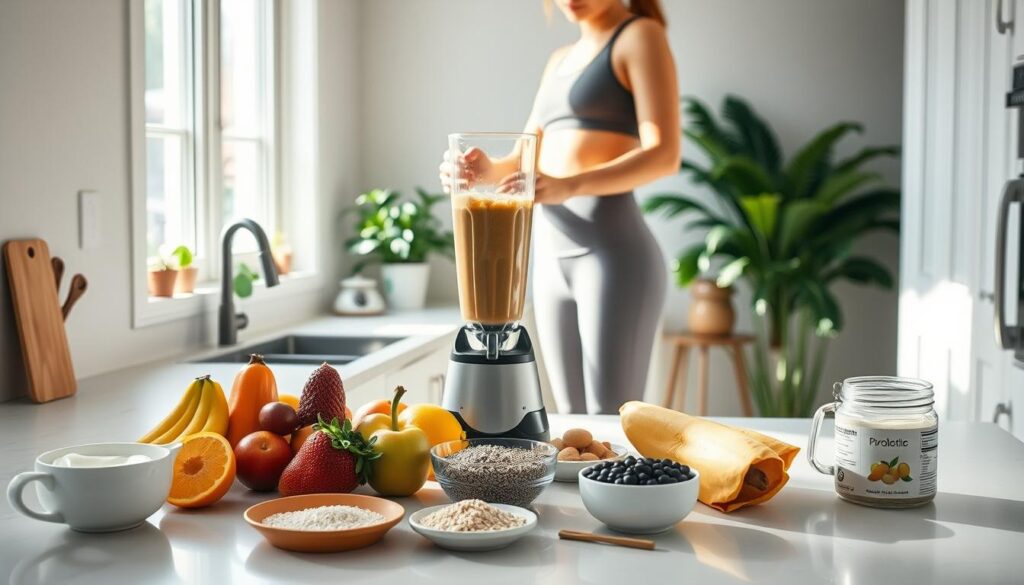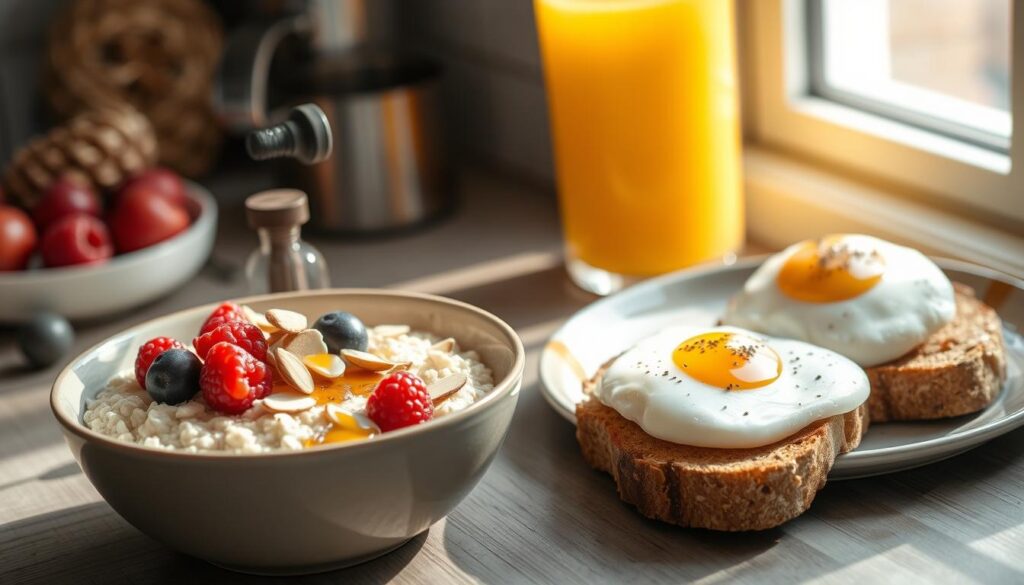Best Morning Habits to Keep Your Gut Happy
Discover the Best Morning Habits to Keep Your Gut Happy and start your day on a healthy note. Learn simple routines for a happier gut.

Ever wake up feeling bloated or sluggish? Your digestive system greatly affects how you feel throughout the day. While trendy hacks like olive oil shots flood social media, experts agree: sustainable routine choices make the real difference.
Your gut does more than process food—it impacts immunity, energy, and even mood. Quick fixes might grab attention, but science-backed habits create lasting health benefits. This isn’t about strict rules; it’s about small, intentional steps.
Ready to transform your mornings? Skip the fads. We’ll share practical, expert-approved tips to nurture your gut health naturally.
Key Takeaways
- Trendy gut health hacks often lack long-term benefits.
- Hydration and fiber are foundational for digestion.
- The gut-brain connection affects daily energy and focus.
- Simple, consistent routines outperform viral trends.
- Your digestive system influences overall wellness.
1. Hydrate First Thing in the Morning
Your body loses water overnight—replenishing it kickstarts digestion. While you sleep, dehydration slows gut motility, making mornings feel sluggish. A glass of water signals your system to wake up and get moving.

Why Water Matters for Digestion
Dr. Uradomo notes that water makes up 70% of digestive tract cells. Without it, the mucosal lining weakens, hindering nutrient absorption. Dehydration also links to bloating and constipation, as fluids keep stools soft.
Tanya Mezher adds,
“Morning water flushes toxins and supports bowel movements.”
Even mild dehydration slows enzyme production, making meals harder to break down.
Tips for Maximizing Hydration
Drink 8–16 oz of water before coffee or tea. Caffeine can irritate an empty stomach, but water creates a protective buffer. Add lemon for alkalizing benefits and to boost enzymes.
| Method | Benefit | Best Time |
|---|---|---|
| Room-temperature water | Gentle on stomach | Immediately after waking |
| Lemon water | Fights indigestion | Before breakfast |
| Coconut water | Electrolytes | Post-workout |
Small sips work better than chugging. Your body absorbs liquids gradually, so pace yourself for optimal hydration.
2. Nourish Your Gut with a Balanced Breakfast
Breakfast sets the tone for your digestive health—choose wisely. According to dietitian Paulina Lee, your stomach acid production peaks early, making mornings ideal for nutrient-dense meals. A well-composed plate supports gut bacteria and reduces inflammation.

Fiber-Rich Foods to Include
Fiber acts as fuel for beneficial gut microbes. These bacteria break it down into short-chain fatty acids, which fight inflammation. Aim for 25–30 grams daily from sources like:
- Chia pudding with berries
- Avocado toast on whole-grain bread
- Oatmeal topped with flaxseeds
Chew slowly and avoid screens. Mindful eating activates your “rest and digest” mode, enhancing nutrients absorption.
Fermented Foods for Probiotics
Fermented foods introduce live probiotics to balance your microbiome. Dr. Uradomo recommends 1–2 tablespoons daily. Pair them with fiber (like yogurt with oats) for a symbiotic effect.
| Food | Key Benefit | Serving Idea |
|---|---|---|
| Kefir | Diverse probiotic strains | Smoothie base |
| Kimchi | Vitamin K2 | Breakfast burrito topping |
| Sauerkraut | Gut lining support | Side with eggs |
These small tweaks turn your morning food into a gut-healing ritual.
3. Incorporate Prebiotics and Probiotics
Think of your gut as a garden—probiotics are seeds, prebiotics the fertilizer. Together, they nurture a thriving gut microbiome. Nutritionist Melanie Murphy Richter explains:
“Without prebiotics, probiotics struggle to colonize. It’s like planting seeds in barren soil.”
Synergy Between Prebiotics and Probiotics
Probiotics are live beneficial bacteria found in fermented foods. Prebiotics are indigestible fibers that feed them. This combo:
- Strengthens the gut barrier, reducing inflammation.
- Helps probiotics survive stomach acid (unlike many supplements).
- Boosts short-chain fatty acid production for energy.
Best Sources for Gut Health
Pair these foods to boost your system:
| Prebiotic Foods | Probiotic Foods | Synbiotic Pairing |
|---|---|---|
| Garlic | Kefir | Garlic-infused kefir dressing |
| Bananas | Kimchi | Banana-kimchi smoothie |
| Asparagus | Yogurt | Roasted asparagus with yogurt dip |
For a clinically studied option, Seed’s Daily Synbiotic combines both (use code EVERYGIRL25). Avoid sugary probiotic drinks—they harm microbial balance.
4. Add Ginger to Your Morning Routine
A simple root could be the missing piece in your digestive wellness routine. Ginger, long revered in Traditional Chinese Medicine for indigestion, now has modern science backing its benefits. Its active compound, gingerol, stimulates saliva and digestive enzymes, easing bloating and gas.
Anti-Inflammatory Benefits
Dr. Uradomo explains:
“Gingerol improves GI motility by relaxing intestinal muscles. It’s also a potent anti-inflammatory, reducing stomach irritation.”
Studies show ginger’s gastro-protective effects may prevent ulcers and soothe inflammation. It’s particularly effective for nausea, including morning sickness.
Easy Ways to Consume Ginger
Incorporate ginger seamlessly into your mornings:
- Tea: Steep sliced fresh ginger in hot water (Traditional Medicinals brand is a tested option).
- Smoothies: Grate a teaspoon into your blender for a zesty kick.
- Seasoning: Sprinkle ground ginger on oatmeal or yogurt.
| Preparation | Benefits | Best For |
|---|---|---|
| Fresh ginger tea | Soothes nausea | Empty stomach |
| Grated in smoothies | Enhances digestion | Post-workout |
| Capsules (1g) | Convenient dosing | Travel |
Start with small amounts—too much can cause heartburn. Consistency matters more than quantity.
5. Move Your Body to Stimulate Digestion
Movement isn’t just for fitness—it’s a secret weapon for digestion. Light activity wakes up your digestive tract, helping food move smoothly. Dr. Uradomo notes:
“A 10-minute walk increases blood flow to digestive muscles by 40%.”
Gentle Exercises for Gut Health
Low-impact movements stimulate peristalsis, the wave-like contractions that push food through your system. Try these:
- Walking: Boosts circulation without stressing your body.
- Tai chi: Slow, deliberate motions reduce bloating.
- Pelvic tilts: Strengthen core muscles supporting digestion.
Yoga Poses to Aid Digestion
Dietitian Paulina Lee recommends twists and bends to massage intestines. These poses enhance energy flow and relieve gas:
| Pose | Benefit | Duration |
|---|---|---|
| Seated Spinal Twist | Stimulates colon | 30 sec/side |
| Downward Dog | Relieves bloating | 1 minute |
| Child’s Pose | Calms stomach | 2 minutes |
Avoid intense workouts before eating—they divert blood from your gut. Consistency matters more than intensity.
6. Prioritize Stress Reduction
Your mental state directly influences digestion—science proves it. High stress levels trigger cortisol release, which can disrupt your entire digestive process. Morning anxiety might explain why you feel bloated before breakfast.
The Gut-Brain Connection
Your gut and brain communicate constantly via the vagus nerve. Dietitian Paulina Lee explains:
“Deep breathing activates the parasympathetic nervous system—your ‘rest and digest’ mode.”
Research by Tanya Mezher shows breathwork increases beneficial gut bacteria by 20%. Chronic stress does the opposite, weakening intestinal barriers and promoting inflammation.
Mindfulness Practices to Try
Cortisol spikes at waking—manage them gently. These methods protect your mental health and digestion:
1. Delay phone use: Avoid emails for 30 minutes. Morning anxiety often starts with screen overload.
2. Lymphatic massage: Rebecca Faria recommends circular motions below the ears to reduce bloating. This stimulates detox pathways.
| Practice | Benefit | Duration |
|---|---|---|
| 5-minute meditation | Lowers cortisol | Before breakfast |
| Gratitude journaling | Boosts serotonin | With coffee |
| Box breathing (4-4-4) | Activates vagus nerve | Anytime |
Studies link chronic stress to IBS and microbiome imbalance. Small morning tweaks impact gut health all day. Your gut reacts to thoughts before food, and nurtures both.
Conclusion: Build a Gut-Friendly Morning Routine
Small daily choices shape how your body feels and functions. A healthy gut isn’t built overnight—it thrives on consistency. Start with one or two habits, like hydrating first or adding fiber-rich foods.
Pair lemon water with a 10-minute walk. This combo kickstarts digestion and reduces bloating. Avoid rushing; stress disrupts your system more than you realize.
Your gut impacts immunity, mood, and energy. Try this sample morning routine:
- Wake → 8 oz water
- 5-minute stretch
- Oatmeal + flaxseeds
- Mindful eating (no screens)
Prioritize wellness with these tiny tweaks. Your gut—and whole body—will thank you.




